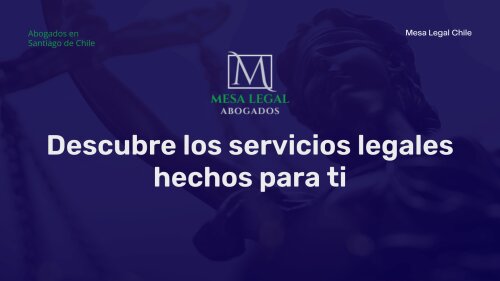Best Adoption Lawyers in Santiago
Share your needs with us, get contacted by law firms.
Free. Takes 2 min.
Free Guide to Hiring a Family Lawyer
List of the best lawyers in Santiago, Chile
About Adoption Law in Santiago, Chile
Adoption in Santiago, Chile, is a legal process designed to provide children with a stable family environment when their biological families are unable or unwilling to care for them. The Chilean adoption system prioritizes the best interests of the child through strict legal procedures and oversight by family courts. Both Chilean nationals and qualified foreign nationals may be eligible to adopt, subject to compliance with Chile's legal requirements. Adoption processes are governed primarily by Chile's Civil Code and the Ley de Adopción (Law 19.620), which detail all necessary steps and safeguards to ensure lawful and ethical adoptions.
Why You May Need a Lawyer
Seeking guidance from a lawyer during the adoption process in Santiago can be invaluable. Lawyers can help in a variety of situations, including:
- Navigating complex legal paperwork and court procedures.
- Understanding eligibility requirements for prospective adoptive parents.
- Representing you in family court hearings and interactions with adoption agencies.
- Ensuring your rights and the rights of the child are protected throughout the process.
- Handling cases involving international adoptions, particularly those requiring compliance with The Hague Adoption Convention.
- Advising on post-adoption legal responsibilities and rights.
- Resolving disputes regarding the suitability of adoptive parents or the validity of parental consent.
Local Laws Overview
Adoption in Santiago, as throughout Chile, is strictly regulated. Key aspects of local laws include:
- Only children legally declared adoptable can be matched with adoptive families.
- The SENAME (Servicio Nacional de Menores) and accredited adoption agencies oversee the matching and placement process.
- Adoptive parents must meet certain age and residency criteria. Married couples, unmarried couples, and single individuals may adopt, although priority is often given to married couples.
- The process involves thorough assessment of prospective parents, including psychological evaluations and home studies.
- Biological parents must provide informed and voluntary consent to the adoption unless their parental rights have been legally terminated.
- All adoptions must be finalized through the Family Court, which makes a formal judgment in the interests of the child.
- Post-adoption, the adoptive child receives the same legal status and rights as a biological child of the adoptive parents.
Frequently Asked Questions
Who can adopt a child in Santiago, Chile?
Adults over the age of 25, whether married, in a civil partnership, or single, can adopt. There is typically an age difference requirement of at least 20 years between the adopter and the child.
Do I need to be a Chilean citizen to adopt in Santiago?
No, both Chilean nationals and foreign nationals can adopt, but foreign nationals must usually demonstrate ties to Chile and comply with specific international and residency requirements.
What is the role of SENAME in the adoption process?
SENAME oversees the protection of minors and manages the adoption system in Santiago. It supervises accredited agencies, determines which children are eligible for adoption, and matches children with suitable families.
How long does the adoption process typically take?
The process can vary but generally takes many months to over a year, depending on the circumstances and the complexity of each case.
What documents are required for adoption?
Required documents usually include identification, proof of income, health certificates, psychological evaluations, and, for foreign nationals, immigration documentation and proof of legal status in Chile.
Can same-sex couples adopt in Santiago, Chile?
Chile’s laws allow both individuals and couples, regardless of gender, to apply for adoption, but married heterosexual couples are typically given priority during placement.
How is the child’s best interest determined?
The family court assesses each adoption case, considering psychological, social, and familial circumstances, always prioritizing the child’s safety and emotional well-being.
Is international adoption possible from Santiago?
Yes, international adoptions are possible but require compliance with both Chilean regulations and international treaties, such as the Hague Adoption Convention, to prevent child trafficking and ensure transparency.
What happens after the adoption is finalized?
Once finalized, the child legally becomes a member of the adoptive family with full rights, including a new legal identity if appropriate. The adoptive parents assume all rights and obligations as if the child was born to them.
Can biological parents change their mind after consenting to adoption?
Once the adoption is finalized by a court judgment, it is typically irreversible. However, biological parents can withdraw consent before the court's final decision, under specific circumstances.
Additional Resources
For those seeking further assistance or information about adoption in Santiago, consider reaching out to:
- SENAME (Servicio Nacional de Menores) - Main government body overseeing adoptions in Chile.
- Accredited adoption agencies operating in Santiago.
- Family Courts (Juzgados de Familia) for information about legal proceedings.
- Colégio de Abogados de Chile - For lawyer referrals specializing in family law and adoption.
- Nonprofit organizations supporting adoptive families and orphans, such as Fundación San José para la Adopción.
Next Steps
If you are considering adoption in Santiago, the following steps can help guide you:
- Begin by gathering information about your eligibility and the responsibilities involved in adoption.
- Consult a family lawyer experienced in adoption law to help you understand your rights and obligations, and to assist with legal paperwork and court procedures.
- Contact SENAME or an accredited adoption agency to initiate the application process.
- Prepare the required documentation and participate in evaluations conducted by authorized professionals.
- Attend all necessary court hearings and meetings as guided by your legal advisor.
- Once matched with a child, continue working closely with agencies and courts to finalize the adoption.
- After adoption, take advantage of support resources for adoptive families and stay informed about your new legal rights and responsibilities.
Seeking professional legal counsel from the beginning can help ensure the process runs smoothly and that both your interests and those of the child are protected at every stage.
Lawzana helps you find the best lawyers and law firms in Santiago through a curated and pre-screened list of qualified legal professionals. Our platform offers rankings and detailed profiles of attorneys and law firms, allowing you to compare based on practice areas, including Adoption, experience, and client feedback.
Each profile includes a description of the firm's areas of practice, client reviews, team members and partners, year of establishment, spoken languages, office locations, contact information, social media presence, and any published articles or resources. Most firms on our platform speak English and are experienced in both local and international legal matters.
Get a quote from top-rated law firms in Santiago, Chile — quickly, securely, and without unnecessary hassle.
Disclaimer:
The information provided on this page is for general informational purposes only and does not constitute legal advice. While we strive to ensure the accuracy and relevance of the content, legal information may change over time, and interpretations of the law can vary. You should always consult with a qualified legal professional for advice specific to your situation.
We disclaim all liability for actions taken or not taken based on the content of this page. If you believe any information is incorrect or outdated, please contact us, and we will review and update it where appropriate.













